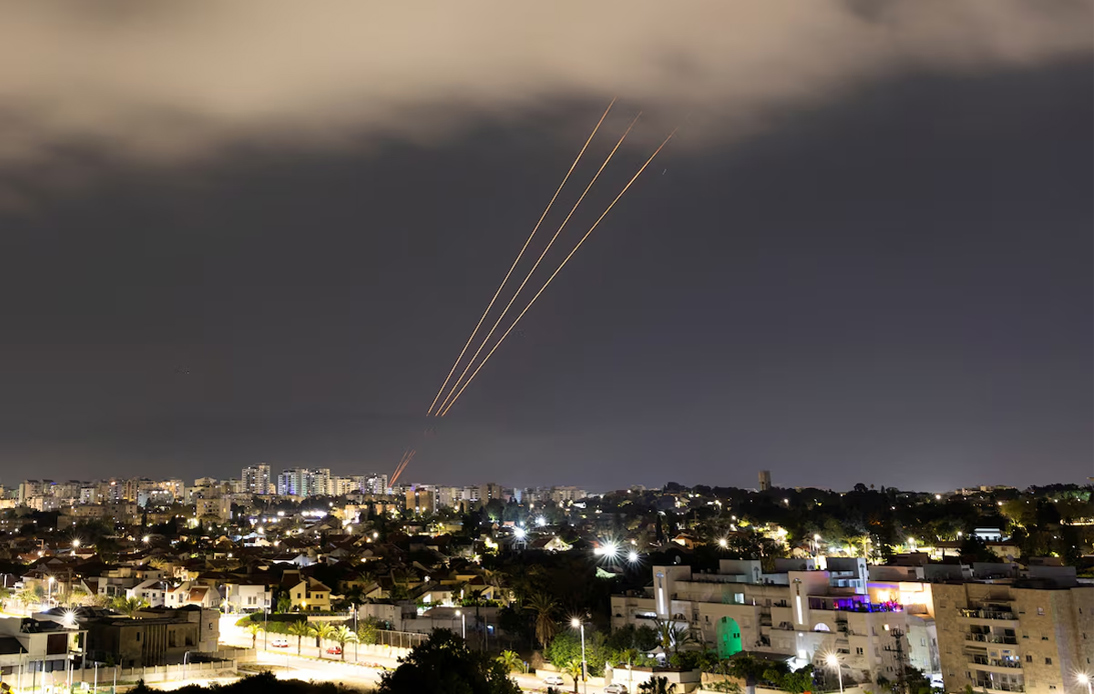
Iran initiated its first direct attack on Israeli territory by launching explosive drones and missile strikes late on Saturday, in what was a retaliatory action that heightened fears of an escalating regional conflict, while the U.S. assured unwavering support for Israel.
Sirens wailed across Israel as distant heavy thuds and bangs were heard, attributed by local media to the aerial interception of explosive drones. Authorities reported that a 7-year-old girl was critically injured.
Israel’s military spokesperson, Rear Admiral Daniel Hagari, reported that Iran fired numerous ground-to-ground missiles at Israel, with the majority being intercepted before crossing into Israeli territory. This barrage included over ten cruise missiles.
According to Hagari, the assault comprised over 200 drones and missiles to date, causing light damage to an Israeli military installation.
Subsequently, the Israeli military communicated that there was no current recommendation for residents to seek shelter, retracting a previous alert and suggesting the immediate threat had subsided.
An unnamed Israeli official on Channel 12 TV hinted at a significant retaliatory action following the attack.
Iran had promised revenge for an alleged Israeli assault on its consulate in Damascus on April 1, which resulted in the deaths of seven Islamic Revolutionary Guard Corps officers, including two high-ranking commanders. Iran described its attacks as retribution for “Israeli crimes.” Israel has yet to confirm or deny its involvement in the consulate strike.
The Iranian mission to the United Nations issued a stern warning to Israel against further provocations, stating that any additional errors would provoke a much harsher response from Iran, and cautioned the U.S. to maintain distance. Nonetheless, Iran considered the issue resolved.
Antonio Guterres, the Secretary-General of the United Nations, expressed grave concern over the potential for a catastrophic escalation across the region following Iran’s actions.
Following a request from Israel, the U.N. Security Council scheduled a meeting for Sunday afternoon to potentially condemn the Iranian attack and consider designating the Iranian Revolutionary Guard Corps as a terrorist organization.
President Joe Biden and Israeli Prime Minister Benjamin Netanyahu had a discussion over the phone on Saturday evening, details of which were to be disclosed later by the White House.
After issuing a warning to Iran against any attacks the previous Friday, President Biden abruptly ended his weekend in Delaware to return to Washington. There, he convened a meeting with his national security team, reaffirming his steadfast commitment to Israel’s security.
President Biden emphasized the absolute commitment of the U.S. to Israel’s defense against threats posed by Iran and its allies, a statement he made on X following the security meeting.
The ongoing conflict in Gaza, which has persisted for seven months, has intensified regional tensions, involving multiple fronts and attracting attacks on Israeli targets from as distant as Yemen and Iraq.
A statement from British maritime security firm Ambrey noted that drones targeting Israel were also reportedly launched by Yemen’s Houthi faction, aligned with Iran.
The escalating confrontations are increasingly resembling a direct, open conflict between Iran and its regional allies versus Israel and its principal ally, the United States. Egypt has called for extreme caution.
The longstanding feud between Israel and Iran has typically been indirect, involving proxies or strikes on each other’s forces in third-party nations.
U.S. and British aircraft were involved in shooting down several drones headed towards Israel over the Iraq-Syria border, as reported by Channel 12. U.S. officials confirmed the downing of multiple drones en route to Israel by the U.S. military.




















